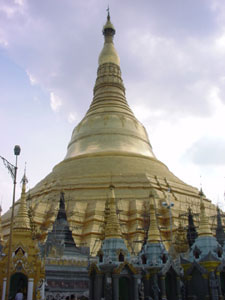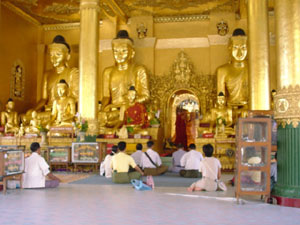![]()
| Myanmar | Yangon | 2002.01.19 |
Myanmar Arrival
The only port of entry into Myanmar is the Yangon International Airport. From the airport, city center is 16km south.
Upon arrival, everyone entering on a tourist visa (must be obtained before arrival) is required to exchange US$200 into "US$ equivalent" Foreign Exchange Certificates (FEC) that look like Monopoly money. See our Myanmar - Facts for the Visitor page for details. We reduced our US$200 x 2 passports = US$400 exchange obligation to US$100 x 2 = US$200 with a US$5 bribe. Another lone Japanese traveler we met reduced her amount to US$100 with a 3 FEC bribe. Yet another American traveler we met was exempted without bribe by politely yet firmly repeating, "I really don't want any FEC." Warned by guidebooks that FEC are difficult to convert back to hard currency, many budget travelers try to reduce their exchange requirement.
Intending to check the bus schedule to Bago before going downtown, we asked the airport taxi to take us to the bus departure point. This was a mistake. Along the way, the taxi driver warned that bus fare had to be paid in Kyat. We didn't have any, and exchanging FEC for Kyat at the airport would have been at the poor government rate. "No problem. I know someone who will give a better rate," our driver assured. We exchanged 40 FEC at the rate of 1 FEC = 600 Kyat.
For all our cunningness, the returns were depressingly low. We learned that the "bus" to Bago is a pickup truck that departs when 10 or more people are crammed in the back. There is no schedule.
Still 12 km North of city center, we asked a sunglass vendor how to get there. We boarded bus 45. An hour later, it terminated on Sule Pagoda Road in the heart of the city. The bus fare was 20 Kyat each, but we were only carrying 1000 Kyat notes. The bus attendant shook his head. "I don't have change for 1000." Another Burmese passenger instantly paid our fare. Why, thank you. The man wouldn't accept anything in return. "It's a gift from me."
In the city, we wanted to exchange another US$100 into Kyat. We asked a taxi driver if he knew where we could exchange. "Try asking at the hotels," he suggested. (Note: if it isn't clear by this point, almost everyone speaks English.) We tried City Star Hotel. The rates weren't much better than the airport taxi driver's friends'. But one of the bellboys said maybe he could find us a better rate elsewhere. He took us to a back room 4 or 5 blocks away. They offered 68,500 Kyat for our $100 bill. Pretty good compared to our first Kyat exchange, we thought. We agreed.
Two days later, the hotel owner in Kyaiktiyo told us we were ripped off. "You should have received 72,000 Kyat for a 100 dollar bill." 3 days later we learned that the black market would pay 700 Kyat per FEC, and White House Guest House in Yangon would exchange 690 Kyat per FEC. Within one hour of landing in Myanmar, we had already lost $7.20 in currency exchanges. In a country where a local person makes $0.50 a day, that's a lot to lose in an hour. Since the Kyat devalues against the dollar monthly, there's no way to know what the going rate is when arriving. Save yourself the hassle by going directly to White House Guest House for currency exchange. White House rates are below the best black market rates but better than every exchange we made.
After stumbling around Yangon for a few hours changing money at poor rates, we returned to the Bago pickup truck departure point on bus 45.
 |
Shwe Dagon Pagoda near the center of Yangon has a large collection of temples, Buddhas, pavilions, and architecture. Admission is US$5. |
 |
Masami sits before the Buddhas at the East face of Shwe Dagon Pagoda. |
Copyright © 2000-2002 Wes and Masami Heiser. All rights reserved.